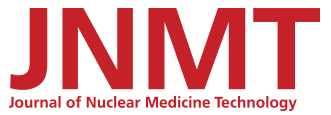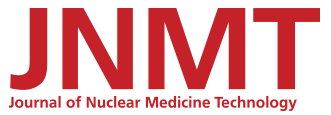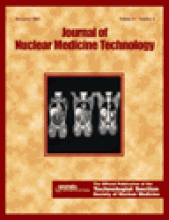
The NMTCB is working on several important projects. On October 1 the Board announced that the first administration of the PET examination will be offered in 2004. Specific information regarding the exact date, content outline, and eligibility requirements will be announced after the spring Board meeting. The PET examination has been under development for the past 2 years, and was originally designed with experienced, certified, or registered (CNMT or ARRT-N) nuclear medicine technologists in mind. Only certified or registered nuclear medicine technologists who have met specific requirements will be eligible to sit for the first administration of the examination in 2004.
In the fall the ARRT announced that they will be allowing nuclear medicine technologists to sit for the CT examination in 2005. The NMTCB has also announced that registered radiographers (RTR) and radiation therapists (RTT) who have completed specific prerequisites will be eligible to sit for the second administration of the PET examination in 2005. The NMTCB is proud to be part of the ongoing collaboration between the professional organizations affected by the advent of fusion imaging.
The third administration of the Nuclear Cardiology Specialty examination was offered on September 13 in paper and pencil format at a limited number of sites, and for the first time, the examination was also offered across the country at LaserGrade testing centers. LaserGrade has over 700 computerized testing centers, enabling the NMTCB to offer the specialty examinations simultaneously across the country, thus significantly decreasing the travel time and expenses incurred by the examinees. The Board is currently evaluating the use of the computerized testing centers, and we are working with LaserGrade to fine tune the process in an effort to continuously improve the delivery of the examinations. Examination analysis is currently underway at press time. The fourth administration of the Nuclear Cardiology Specialty examination will be offered exclusively via computer across the country on August 14, 2004.
I have received many requests for recommendations of reference materials to assist candidates as they prepare for examinations. Members of the Board of Directors are not allowed to make recommendations for study materials related to any of the examinations we offer because it would be a conflict of interest. The Content Outline should be used to guide prospective examinees as they prepare for the test (check www.nmtcb.org for the most recent version). I also encourage candidates to contact professional organizations for guidance and assistance in locating the appropriate references and educational resources.
The Board is also working on an ethics policy and the disciplinary procedures that will be followed when violations occur. We anticipate that we will be able to announce an implementation date sometime this spring.
Finally, the most controversial issue that we are working on at the moment is the implementation of a mandatory continuing education (CE) policy. The Board will be voting on the final draft of the policy this spring. This topic has been hotly debated by past and present members of the Board over the years, and yes, the results of the survey that was included in the renewal mailing last year indicated that 51.4% of the 13,066 respondents did not want us to mandate CE. However, 48.6% supported the implementation of a mandatory CE policy. This is only a 2.8% difference, representing an excess of 370 technologists who said that we shouldn’t mandate CE.
In the past 2 years the Board conducted a policy survey of other allied health credentialing organizations. Twenty-seven organizations responded to the survey, and 26 (96.3%) of these agencies require CE credits for certification renewal. The National Board for Certification in Occupational Therapy (NBCOT) conducted a similar survey in 2002. Eighty-three credentialing agencies responded to their survey, and 91.46% said that they require their certificants to satisfy a CE requirement. The data from these studies indicate that the NMTCB is part of a very small percentage of allied health credentialing agencies that does not currently require some form of CE.
In addition to the empiric data, the Board also conducted a literature search to help us understand why so many of our colleagues in the allied health profession mandate CE. The search revealed that rapid advances in technology and public demands related to accountability and consumer protection are important factors that drive the need for mandatory CE. Cynthia McLoughlin, in an article entitled “On Mandatory Education,” said that “mandating CE has become the standard way of demonstrating that licensing boards and leaders in each profession are working to hold the members of that profession to high standards of practice.” A common theme runs through the articles; even though mandatory CE is not perfect, it is the best alternative available and may be useful in maintaining professional competence and enhancing the quality of health care. The consensus is that mandatory CE is better than the alternatives, such as time-limited certificates and periodic examinations. The NMTCB renewal survey also revealed that certified nuclear medicine technologists do not want to have to take the examination again, and would prefer to participate in CE as an alternative. I would also like to reiterate that the NMTCB will not be a provider of CE, and will not benefit financially from the implementation of a mandatory CE policy.
As you can see, the NMTCB is working on several new initiatives, and we hope to finalize the details associated with these projects before, during, and after our spring Board meeting. The best way to keep up-to-date on the latest news is to check our Web site (www.nmtcb.org). We will add new content to the site as it becomes available. If you have questions, concerns, or suggestions you can contact me at kmurphy{at}gwcc.commnet.edu, or you can call the NMTCB office at 404-315-1739.







